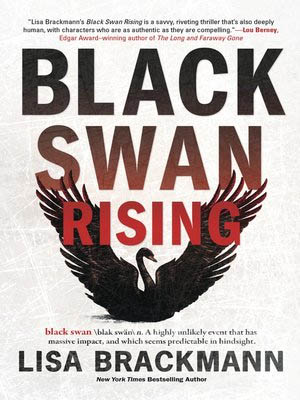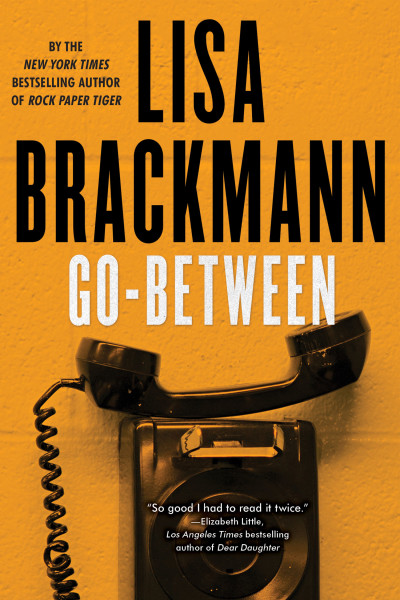All these mass shootings have inspired me to post a book review I did for FlagLive in October 2018 for Lisa Brackmann’s Black Swan Rising. Brackmann’s novel is probably the best approach to a conversation about what happened last weekend that I can think of. Scroll down past the cover to read the review.

Think about the next mass shooting. Not the one that happens every day, in which two or three people die unspectacularly in another state, and we don’t even hear about it. I’m talking about the next big one. Think about the next time someone brings an AR-15 or two into a place where we could imagine ourselves—or where we could imagine our children—and opens fire, killing dozens of people who shouldn’t die that day. We all know it’s going to happen. Maybe not this week or this month, but in the next year, for sure. And think about what you’re going to say when it happens. Because this is the important point: you already know. You have already reacted to this event. Your opinion is already formed. All of our opinions are. We have our tweets ready. The NRA has drafted their next speech. Political teams on both sides of the aisle have their press releases ready. Television news teams have stock mass shooting footage waiting in a folder on their computer and “experts” on speed dial. The experts have already formed their arguments. Bumper stickers have been printed. They’re already stuck.
I’m not just talking about mass shootings, here. Pick any issue in which battle lines have been drawn and trenches dug. Think about the next time a man in power is accused of sexual assault. We’ve already exonerated or convicted the man, dismissed or believed the woman.
We don’t even need the shooting or the assault. We could have the argument right now. The same nothing would change.
But let’s say, hypothetically, that we want to live in a world where men don’t mow down dozens of strangers with assault rifles or feel entitled to women’s bodies. How do we have a real conversation about change?
This is the challenge that Lisa Brackmann embraces in her latest thriller, Black Swan Rising. The novel begins with a woman being harassed before she’s even named. Sarah Price works social media for a congressional campaign. She also has a secret past. They, whoever they are, have found her. The harassment has started all over again. She wonders if her past could derail her boss’s reelection campaign. Meanwhile, across town, local TV reporter Casey Cheng is covering a mass shooting when she gets shot. As part of her recovery, she sets out to investigate the aftermath of mass shootings. Her investigation reveals that her shooter aligned himself with a misogynist, neo-Nazi movement. There’s every reason to believe that more shootings are on the way, and both Sarah and Casey are targets.
All of this is established in the opening pages of the novel. Brackmann sets up a difficult tightrope for herself to walk. Sarah and Casey could easily become mouthpieces for the author; the book could easily become preachy and dull. It could feel like one more voice shouting at us from an entrenched position. Brackmann—the author of the New York Times bestseller Rock, Paper, Tiger—is too skilled for that. First, she makes Sarah and Casey feel real. They’re both flawed, confused, and trying to move through incredibly difficult circumstances. Sarah is not at all sure she has the courage to do what she needs to do. Casey may have too much courage. They both may end up dead. More to the point, you care about them staying alive. Second, even though the novel is built around a political campaign, the presumable Democrat (parties are never mentioned) is sweet and caring, but also has violence issues and carries a gun. The Republican banks on racism but has a big heart. Both are at times likeable and despicable. The campaign comes to take a backseat to Sarah and Casey’s intersecting stories. Complicated issues are raised and moral decision must be made. And there are guns. So many guns. And shootings. Always too many shootings. Also, as a respite, there’s a lot of baseball and good craft beer. Through it all, the plot moves like a roller coaster. You get pinned to your seat and flung at increasing speed down a track that feels like it could throw you at any second. It’s exciting. You find yourself at the end way too quickly.
The ending itself is a surprise and a risk, but, for me, totally satisfying. It leaves me realizing that I lost myself in the book, but once I was done, I couldn’t help meditating on this culture of toxic masculinity that we’re living in. I feel like I learned something about what a woman has to navigate, about where she finds support and where there is none, and about the institutions that protect and nurture bad behavior by men. I feel a little more ready to more ready to have a conversation that’s deeper than two sides shouting at each other across a battlefield.

 My next event for Dead Extra tomorrow, May 17, at 7:30 PM at
My next event for Dead Extra tomorrow, May 17, at 7:30 PM at  I have a love/hate relationship with crime novels. I love the heavy plots, the journeys into society’s seedy underbelly, the challenge of staying one step ahead of the mystery. I love how tough they are. I hate that most crime novels these days have cops, FBI agents, and the like as protagonists. I grew up a “white trash” kid, then became a punk rocker. Most of my associations with cops were as a kid or young adult getting harassed, shaken down, or cracked in the head by them. After suffering so many humiliations at the hands of the law, I can’t enjoy a book that makes those guys the heroes. Especially when the bad guys are so similar to the people I grew up with. So I mostly read old crime novels, stuff by Raymond Chandler and Dashiell Hammett and writers like them, writers with a distrust of the system and of the wealthy, writers whose protagonists are outsiders just trying to make it. Where, I often wonder, are the contemporary equivalents?
I have a love/hate relationship with crime novels. I love the heavy plots, the journeys into society’s seedy underbelly, the challenge of staying one step ahead of the mystery. I love how tough they are. I hate that most crime novels these days have cops, FBI agents, and the like as protagonists. I grew up a “white trash” kid, then became a punk rocker. Most of my associations with cops were as a kid or young adult getting harassed, shaken down, or cracked in the head by them. After suffering so many humiliations at the hands of the law, I can’t enjoy a book that makes those guys the heroes. Especially when the bad guys are so similar to the people I grew up with. So I mostly read old crime novels, stuff by Raymond Chandler and Dashiell Hammett and writers like them, writers with a distrust of the system and of the wealthy, writers whose protagonists are outsiders just trying to make it. Where, I often wonder, are the contemporary equivalents? My university has a running column in the Ventura County Star on Sundays. Our public relations person asked me to contribute a column recommending books for the summer. She also wanted me to make it newsy. So I did what everyone in the news is doing. I started with Donald Trump. This was my original first paragraph:
My university has a running column in the Ventura County Star on Sundays. Our public relations person asked me to contribute a column recommending books for the summer. She also wanted me to make it newsy. So I did what everyone in the news is doing. I started with Donald Trump. This was my original first paragraph: